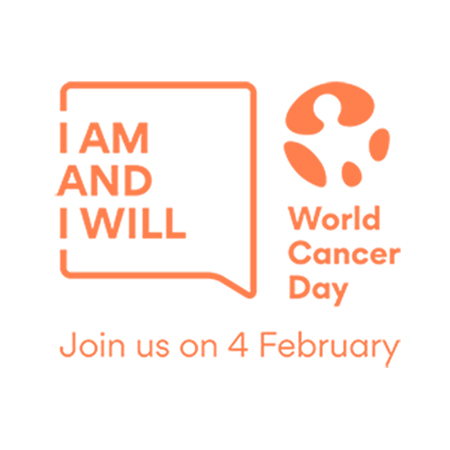To mark World Cancer Day on February 4, the Union for International Cancer Control (UICC) will give voice to and say thank you to the nurses, doctors, researchers, volunteers, advocates, and other caregivers in oncology from around the world, as well as government agencies, who have worked through the COVID-19 pandemic.
The World Cancer Day theme “I Am and I Will” encapsulates the extraordinary spirit and the strength of the cancer community. The stories captured throughout the past year are being showcased on the occasion of World Cancer Day in testimonies and articles on a dedicated page of the official website. These stories highlight that although the pandemic is threatening the progress being made in the fight against cancer, it has also created the opportunity to address systemic weaknesses in many national health systems.

Photo credit: UICC
UICC Survey Results Showcase Struggles
A survey conducted by UICC with over 100 of its member organizations in 55 countries including civil society, hospitals, research centers, and patient support groups revealed that their income and organizational activities are under significant pressure, with almost three-quarters reporting reductions in income of anywhere from 25% to 100% in 2020 and similar projections for 2021. An analysis of the survey results was recently published in The Lancet Oncology.
The testimonies from UICC members further confirm the difficulties for cancer organizations in maintaining life-saving services, not only due to a drop in resources but also because of the necessary measures enacted to contain the spread of the coronavirus and fears of contagion on the part of patients. Reports highlight exacerbated shortages in front-line staff, sometimes redirected to the COVID-19 response; interruptions and delays in prevention programmed, diagnostics and testing, clinical trials, and research; difficulties in engaging in community outreach with restrictions on travel and social gathering; and greater barriers to accessing essential medicines in low- and middle-income countries.
Anil D’Cruz, MD, President of UICC and Director of Oncology at Apollo Hospitals in India, said, “It appears quite certain that disruptions to cancer services in the past year will lead to diagnosis at later stages [of disease], which in turn will translate into higher cancer-related mortality. Worse still, the wider economic impact of the pandemic on cancer care in all probability will be felt for many years to come, even in high-income countries—in low- and middle-income countries, the impact is unfathomable. However, it is heartening to see the incredible response of the cancer community to mitigate these consequences both in India and elsewhere. Their stories are inspiring and these organizations need all the support we can provide to keep doing their incredible work.”
Progress Made by Organizations and Health-Care Workers
The testimonies that UICC is showcasing illustrate how organizations and health-care workers are rallying across the globe to support patients, resume cancer screenings and diagnostics, maintain awareness on the need for prevention, and provide a safe environment for treatment. Volunteers have mobilized to deliver medication and even food to patients in need and ensure transportation to care centers. The private sector is developing innovative technologies to reduce the time spent in care settings while maintaining quality of treatment. Digital technology is allowing doctors and research centers to collaborate and share knowledge at a global level, accelerating the move towards greater patient-centered care.
“COVID-19 has impacted cancer control globally and the response by the cancer community has been extraordinary—heroic, even. This year, more than ever, it is appropriate that we celebrate their achievements on World Cancer Day. Let us all aim in 2021 to refocus our collective efforts on the long-term challenges that cancer poses to every country in the world. We must prevent more, diagnose earlier, and ensure that all people living with cancer have access to the quality treatment they need.”— Cary Adams, BSc (Hons), MBA
Tweet this quote
Member of the UICC Board of Directors Miriam Mutebi, MBChB, MMed, a consultant and breast cancer surgical oncologist at Aga Khan University Hospital in Kenya, said, “There has been notable progress in cancer care in recent years. In high-income countries, we have seen drops in incidence and mortality rates for certain cancers. In low- and middle-income regions such as Africa, we are seeing a promising increase in awareness about cancer as well as moves towards the implementation of national cancer control plans. Now is not the time to lose ground but, moving forward, we must not only take advantage of the adaptations and innovations that are emerging as a ‘silver lining’ to COVID-19…we must also take the opportunity to improve health systems as the pandemic passes.”
Considerable challenges remain in the fight against cancer. The widespread impact of the COVID-19 pandemic will make it harder for countries to achieve certain sustainable development goals—in particular, health targets and universal health coverage.
Cary Adams, BSc (Hons), MBA, Chief Executive Officer of UICC, said, “COVID-19 has impacted cancer control globally and the response by the cancer community has been extraordinary—heroic, even. This year, more than ever, it is appropriate that we celebrate their achievements on World Cancer Day. Let us all aim in 2021 to refocus our collective efforts on the long-term challenges that cancer poses to every country in the world. We must prevent more, diagnose earlier, and ensure that all people living with cancer have access to the quality treatment they need.”
World Cancer Day 2021 is dedicated to the courage and achievements of people living with cancer and their families, as well as the nurses, doctors, researchers, volunteers, advocates, and others who care for them and work on their behalf—and calls for everyone in helping to save lives from this disease.

